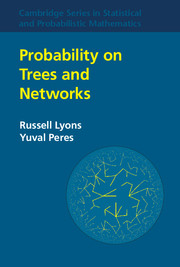Book contents
- Frontmatter
- Contents
- Preface
- Chapter 1 Some Highlights
- Chapter 2 RandomWalks and Electric Networks
- Chapter 3 Special Networks
- Chapter 4 Uniform Spanning Trees
- Chapter 5 Branching Processes, Second Moments, and Percolation
- Chapter 6 Isoperimetric Inequalities
- Chapter 7 Percolation on Transitive Graphs
- Chapter 8 The Mass-Transport Technique and Percolation
- Chapter 9 Infinite Electrical Networks and Dirichlet Functions
- Chapter 10 Uniform Spanning Forests
- Chapter 11 Minimal Spanning Forests
- Chapter 12 Limit Theorems for Galton-Watson Processes
- Chapter 13 Escape Rate of Random Walks and Embeddings
- Chapter 14 RandomWalks on Groups and Poisson Boundaries
- Chapter 15 Hausdorff Dimension
- Chapter 16 Capacity and Stochastic Processes
- Chapter 17 RandomWalks on Galton-Watson Trees
- Comments on Exercises
- Bibliography
- Glossary of Notation
- Index
- Plate section
Chapter 6 - Isoperimetric Inequalities
Published online by Cambridge University Press: 19 January 2017
- Frontmatter
- Contents
- Preface
- Chapter 1 Some Highlights
- Chapter 2 RandomWalks and Electric Networks
- Chapter 3 Special Networks
- Chapter 4 Uniform Spanning Trees
- Chapter 5 Branching Processes, Second Moments, and Percolation
- Chapter 6 Isoperimetric Inequalities
- Chapter 7 Percolation on Transitive Graphs
- Chapter 8 The Mass-Transport Technique and Percolation
- Chapter 9 Infinite Electrical Networks and Dirichlet Functions
- Chapter 10 Uniform Spanning Forests
- Chapter 11 Minimal Spanning Forests
- Chapter 12 Limit Theorems for Galton-Watson Processes
- Chapter 13 Escape Rate of Random Walks and Embeddings
- Chapter 14 RandomWalks on Groups and Poisson Boundaries
- Chapter 15 Hausdorff Dimension
- Chapter 16 Capacity and Stochastic Processes
- Chapter 17 RandomWalks on Galton-Watson Trees
- Comments on Exercises
- Bibliography
- Glossary of Notation
- Index
- Plate section
Summary
Just as the branching number of a tree is for most purposes more important than the growth rate, there is a number for a general graph that is more important for many purposes than its growth rate. In the present chapter, we consider this number, or, rather, several variants of it, called isoperimetric or expansion constants. This is not an extension of the branching number, however; for that, the reader can see Section 13.7.
Our main interest in expansion constants is to apply them to random walks and percolation on infinite graphs. In particular, whether the expansion is zero or positive plays a crucial role in determining qualitative behavior of these probabilistic processes. This will be seen here as well as in the later Chapters 7, 8, 10, and 11. A similar role is played on finite graphs, but we touch on finite graphs only briefly in Section 6.4.
The second half of this chapter concerns isoperimetric and expansion profiles, functions that measure the size of the boundary of a set compared to the size of the set itself, when such a ratio is not necessarily bounded away from 0. Again, we present applications to random walks and to percolation.
Flows and Submodularity
A common illegal scheme for making money, known as a pyramid scheme or Ponzi scheme, goes essentially as follows. You convince 10 people to send you $100 each and to ask 10 others in turn to send them $100. Everyone who manages to do this will profit $900 (and you will profit $1000). Of course, some people will lose $100 in the end. But suppose that we had an infinite number of people. Then no one need lose money and indeed everyone can profit $900. But what if people can ask only people they know? Suppose that people are at the vertices of the square lattice and know only their four nearest neighbors. Is it now possible for everyone to profit $900? If the amount of money allowed to change hands (that is, the amount crossing any edge) is unbounded, then certainly this is possible. But what if the amount crossing any edge is bounded by, say, $1,000,000? The answer now is no.
- Type
- Chapter
- Information
- Probability on Trees and Networks , pp. 174 - 232Publisher: Cambridge University PressPrint publication year: 2017



